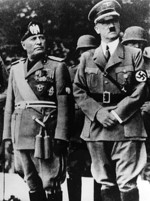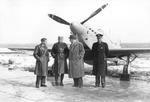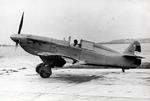
Yugoslavia
| Full Name | 23 Kingdom of Yugoslavia | |
| Alliance | Axis - Minor Member Nation or Possession | |
| Entry into WW2 | 6 Apr 1941 | |
| Population in 1939 | 15,400,000 | |
| Military Deaths in WW2 | 446,000 | |
| Civilian Deaths in WW2 | 581,000 | |
| - Civ Deaths from Holocaust | 57,000 |
Contributor: C. Peter Chen
ww2dbaseThe nation of Yugoslavia was established in 1918, born out of a pan-South Slav nationalist sentiment shared among the Serbs, Croats, and Slovenes against Austria-Hungary. Major tensions between the different ethnic groups within the country began as early as 1921, during the writing of the constitution, and over time language, religious, and other differences slowly added weight to the various disagreements. In the late 1920s, the Croatian nationalist Ustase movement began receiving support from Italy as Benito Mussolini wished to maintain the disunity within Yugoslavia in preparation of a possible future aggressive move by Italy; Hungary also befriended the Croats with similar intentions. The Soviet Union had an interest in Yugoslavia as well, with Soviet military intelligence agents establishing cells in the country and providing military training for future fighters. Officially, the Yugoslavian government maintained close relationships with Britain and France, but the changing European political situation in the mid-1930s led to an attempt at establishing a friendly stance with Germany and Italy, even as Regent Prince Paul personally sympathized with the Western Allies. After the European War began, Yugoslavia was reluctantly pressured into joining the Axis alliance, and it prompted mass demonstrations and an overthrow of the regency. Seeing that Yugoslavia could not be concretely made a reliable ally to secure the Balkan Peninsula, Adolf Hitler decided to occupy the country. The Yugoslavian military surrendered to the joint-invasion by Germany, Italy, Hungary, and Bulgaria on 17 Apr 1941. The royal family and the government fled to Britain.
ww2dbaseGermany broke up occupied Yugoslavia by taking control over much of the Serbia region; establishing a nominally independent Croatia; giving Slovenia, Kosovo, and Dalmatian regions to Italy; giving northern Serbia to Hungary; and giving Macedonia region to Bulgaria. Anti-German resistance in occupied Yugoslavia began almost immediately after the invasion. The disunity between the various ethnic and political factions in the country expectedly produced two separate resistance movements, however. One movement, the Chetniks led by General Dragoljub "Draza" Mihailovic, had the support of Serbs, monarchists, and the remnants of the Royal Yugoslav Army. The Chetniks had the support of the Yugoslavian government-in-exile. Mihailovic initially attempted to coordinate actions with the other, the Communists, but ideological differences soon led to his re-thinking of strategy, shifting from a purely anti-German stance to a pro-Yugoslavia stance, meaning that he allowed the scaling back of resistance activities in order to bide time and build strength, with the short-term goal of minimizing brutal German reprisals and the long-term goal of re-establishing the Yugoslavian monarchy. The Communists (officially "People's Liberation Army and Partisan Detachments of Yugoslavia" after 1942), had the support of republicans and liberals. Unlike the Chetniks, the Communists were extremely aggressive against the Germans and anyone in the way of the Communist expansion. The two groups' differences soon grew into conflict, with the Chetniks assaulting Communists by Nov 1941. Between 1941 and 1943, the Western Allies supported the Chetniks while the Soviet Union supported the Communists; in 1943, during the Tehran Conference, the Soviet Union persuaded United States and Britain to switch their support from the conservative (and thus appearing meek) Chetniks to the aggressive Communists. Between 1943 and 1945, the Communist partisan forces were gradually consolidated under Josip Broz Tito. An attempt was made in Jun 1944 to unite the two factions, by means of the Tito-Subasic Agreement signed on the island of Vis and approved by King Petar II, but this agreement ultimately would not secure the cooperation it aimed for, and the two factions continued to work toward each of their own vision of the future of Yugoslavia. Yugoslavian resistance tied down a great number of German troops to operate a series of protracted anti-partisan campaigns. During the final phases of the war in Yugoslavia, Communist partisans provided intelligence for the successful invading Soviet forces, and in fact drove out German troops, who were already in retreat toward Austria, from much of Yugoslavian territory ahead of the Soviets. Meanwhile, the Chetniks fought the troops of the German puppet Independent State of Croatia, achieving mixed results. Soviet troops took control of Belgrade on 20 Oct 1944. On 6 Apr 1945, partisans took control of Sarajevo. German troops evacuated Zagreb on 7 May, and Communist partisan troops entered that city two days later. Although the fighting phase of the European War was supposed to be over after the German surrender, fighting continued for many days to come as the German surrender did little to settle the two sides in what was effectively an ongoing civil war in Yugoslavia. It would not be until the end of the month when all Croatian, Serbian, and the few remaining German units would surrender to British authorities. In the final stages of the European War, Communist partisan fighters also ventured into Austria alongside Soviet troops; Tito did not withdraw them out of Austria until 20 May.
ww2dbaseYugoslavia suffered roughly 1,000,000 deaths during the European War, about 40% of which military and 60% civilian. Of the civilian deaths, a high percentage were attributed to genocide, including Jews at the hands Germans and Yugoslavian collaborators, Serbs and Roma at the hands of Croatians, Muslims and Croats at the hands of the Chetniks, and Slovenes at the hands of the Italians. The end of the war did not spell the end of such atrocities; ethnic killings would continue in Yugoslavia for many decades to come.
ww2dbasePrior to the end of the war, in Mar 1945, Tito had already been recognized by the Allies as the Prime Minister of Yugoslavia, and he assumed control of the country at the end of the European War. King Petar II allowed a referendum to determine the future of the country; meanwhile, he remained abroad. In 29 Nov 1945, the people of Yugoslavia voted to depose the monarch, but King Petar II refused to abdicate. On the same day, Tito declared the Federal People's Republic of Yugoslavia, and the newly established parliament affirmed Tito's position as the prime minister. Mihailovic, the leader of the Chetniks during the war, was captured in 1946. He was given a show trial, during which his anti-Communist stance was portrayed as if it was German collaboration. He was found guilty and was executed very shortly after.
ww2dbaseSources:
Gregory Freeman, The Forgotten 500
Wikipedia
Last Major Update: Feb 2014
| People | ||
| Cvetkovic, Dragisa | Nedić, Milan | Petar |
| Mihailovic, Dragoljub | Pavelić, Ante | Tito, Josip |
| Events Taken Place in Yugoslavia | ||
| Balkans Campaign | 28 Oct 1940 - 1 Jun 1941 | |
| Belgrade Strategic Offensive Operation | 14 Sep 1944 - 24 Nov 1944 | |
| Aircraft | ||
| IK-3 | ||
Photographs
 |  |  |  |
Yugoslavia in World War II Interactive Map
Você gostou deste artigo ou achou este artigo útil? Se sim, considere nos apoiar no Patreon. Mesmo USD $1 por mês já vai longe! Obrigado. Por favor, ajude-nos a espalhar a palavra: Fique atualizado com WW2DB: |
Visitor Submitted Comments
19 Jun 2017 12:51:35 PM
My great-uncle last name Barach first name unknown was beheaded during WW II in Yugoslavia, probably in Croatia. He was an ethnic Serb
13 Mar 2018 08:21:38 AM
Raymond Perica About your uncle: Barac and Barach are common Croatian surnames
http://www.prezime.net/Barač
http://www.prezime.net/Barać
Rarely they are Serbs, but with Croatian origin. If you know place of your uncle's origin I could tell you more.
How do you know he was "beheaded"? I ask because Yugoslavia pushed a lot of lies about WW2 (to cover partisan & Chetnik atrocities, also to get bigger reparation money from Germany). In after WW2 Yugoslavia if you claimed someone from your family was killed (slaughtered, BEHEADED is The Best) from Croatian Ustashe, especially in working ("concentration") camp, you got a Yugoslav pension, settlement, and secured your whole family.
I grew up knowing that Croatian Ustashe SLAUGHTERED my grandfather from my Serbian half of family, in front of his own children who were witnesses. This year I've found a paper signed by this very aunt & uncle, where they ask from the State to proclaim my grandfather dead (to inherit his real estate) because in 1942 he was taken in one Bosnian town by Germans! Not only that, I've found out that they were not Serbs, but Orthodox Wallachs. In YU, especially in Croatia, it was very prosperous to be Serb, Serbs were superior in Croatia until 1991 so most Orthodox people declared themselves as Serbs. I feel deceived, fooled and ashamed by my own ancestors and my State.
25 Nov 2018 03:29:02 PM
I know very little about my grandfather other than he was a soldier (probably an officer) and his name was Derok Milan. The last trace I know of his was around 1945. I would appreciate knowing how I could find out anything more about him.
2 Jan 2019 04:05:03 AM
Trying to find the missing link for my family that came to Australia. My great great grandfathers surname is Lasberger but he was born on Vis in Yugoslavia. We have no recording of what the name was prior to him coming to Australia and it being anglicised I assume. We know his wife’s name. She is Paulina Lovratich - once again we think the spelling is wrong and she was born in 1899 in Croatia in Molat.
Any help would be amazing as we lost all family when my great great grandfather and mother came to Australia.
23 Apr 2020 09:26:23 AM
I'm trying to find out about my father (Radisav Vukadinovic, possibly known as Kukalj). He fought with Tito, was taken prisoner and spent four years in a German POW camp.
He married my mother, a German actress: Dolores Holve. We arrived in Australia in Feb 1951.
Does anyone know anything about him?
20 Apr 2022 02:32:33 AM
I am interested in finding anything about my father Nikola Miletic born in Kolasin Yugoslav on the 6th Dec 1909, he served in the army from 1939 Soldier in Chetniks (Yugoslav Army) supporting the Germans until 1941 when I think he was involved in the exiling of King Peter to London and was later seen in a British Army uniform
9 Mar 2023 07:22:24 PM
My Great Grandfather's name was Milan Sava Pavkovich, born on 21 JUL 1918, he was in the Royal Yugoslavian Army but fought with the Chetniks. He moved to Chicago in 1953, and I would like to find more information on him, as my Grandmother never spoke of him.
All visitor submitted comments are opinions of those making the submissions and do not reflect views of WW2DB.

- » US State Lawmaker John Winter Caught Using Racial Slur "Jap" Before Visiting Internment Camp Site (11 Jun 2025)
- » Köln/Cologne Evacuated After Discovery of WW2 Bombs (4 Jun 2025)
- » US Women's Army Corps "Six Triple Eight" Awarded with Congressional Gold Medal (30 Apr 2025)
- » Race, Holocaust, and African-American WW2 Histories Removed from the US Naval Academy Library (7 Apr 2025)
- » US Government Plans to Purge WW2 Information (17 Mar 2025)
- » Ver todas as notícias
- » 1,173 biographies
- » 337 events
- » 44,917 timeline entries
- » 1,245 ships
- » 350 aircraft models
- » 207 vehicle models
- » 376 weapon models
- » 123 historical documents
- » 261 facilities
- » 470 book reviews
- » 28,480 photos
- » 365 maps
Lt. Gen. Lewis B. "Chesty" Puller, at Guadalcanal
Por favor, considere nos apoiar no Patreon. Mesmo R$1 por mês já faz uma grande diferença. Obrigado!
Ou, por favor, nos apoie adquirindo alguns produtos do WW2DB na TeeSpring. Obrigado!
5 May 2017 09:14:43 AM
How can I find information about a soldier that did not return from the war? Jakob Haug F Post # 840-519